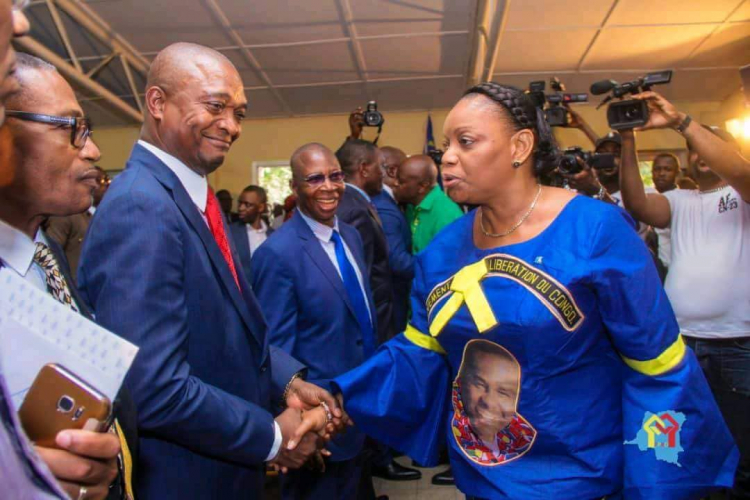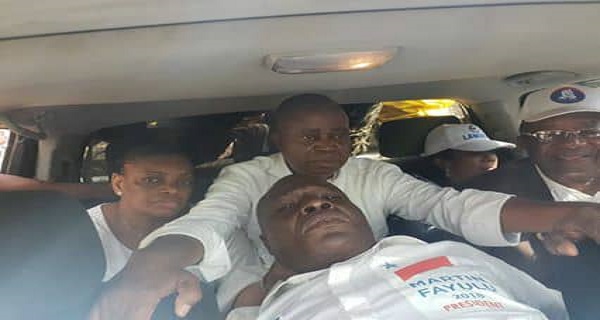DRC 2018: A One-on-One with Congo's Rising Woman of Power

Sunday 23 December 2018. This is a date that every citizen of the Democratic Republic of the Congo has in mind. Indeed, in a few days, the second largest African country will choose their head of State for the third free elections ever held. On one hand, stands Emmanuel Ramazani Shadary, former Vice-Prime Minister and current DRC President's pick. On the other hand faces Martin Fayulu, a well-respected businessman and national deputy. Joseph Kabila, outgoing controversial President for 17 years, remained in power two more years in spite of the end of his presidential term.
When one thinks about women in the Congolese political landscape, some names barely come to mind. Eve Bazaiba is one of the few that can luckily be counted on the fingers of at least one hand. National deputy of Basoko (Northeast Congo), Secretary General of the MLC party (Movement for the Liberation of Congo), this 53-year-old has navigated all the spheres of a dog-eat-dog world that she knows too well.
"We are in a very delicate situation," said Eve Bazaiba to Peacock Plume, regarding the presidential elections, postponed twice by the authorities since 2016.
Arrested several times in her mid-twenties under the regime of repressive former President Mobutu Sese Seko, imprisoned four days under the one of former President Laurent-Desiré Kabila, this progressist activist imposed herself throughout time as an acclaimed personality in the opposition in the DRC.
"The crises in Congo are always caused by the illegitimacy of the institutions maintained illegally by those in power," said the mother of four. "This is a dangerous game and if we don’t play by the rules, our situation might get worse and even bring us back to our darkest days, like during the Second Congo War." she continues.
Bazaiba's fierce and direct voice can often be heard in the media when it comes to denouncing violations of democracy or standing up for human rights. Co-leading the MLC—Second biggest opposition party—for six years, she has relentlessly fought for the liberation of its President from the International Criminal Court, Jean-Pierre Bemba. This prominent figure and unsuccessful opponent to Joseph Kabila in the 2006 presidential elections was detained for alleged war crimes and crimes against humanity since 2008. However, the Congolese political spectrum was shaken when Bemba was unexpectedly acquitted of all charges last June and returned to Kinshasa. The popular ex-Vice President is regarded as the biggest threat to potential reelection of President Kabila or his protege. He eventually was forbidden to run for President last summer by the Congolese Constitutional Court.
"Who would defend our point of view?" explains Bazaiba about her role in the political dynamics of this country at the heart of American, French and Chinese interests in Africa. "Speaking in the media and convincing the Congolese is good. But going to the decision-making institutions to change things from the inside is much better. The presidential majority and other parties needed counterpowers, a kind of elected “critical mass”, she insists.
Eve Bazaiba and Adolphe Muzito surrounding a wounded Fayulu as they seek refuge in a car after being attacked by security forces while campaigning. Image Credits: Touteheure.com
When asked about the absence of women in Politics, "We keep on whining and moaning about how we’re victims of violence, how poor we are, how we suffer. But in reality, if we take into account the informal economy, women own the economic power of the Congo! So why not using these same skills, that we use to feed our husband and kids, in the formal world and its institutions?" she replied passionately. The advocate for sexually abused women during armed conflicts continues, "Women in our country have a demographic power. If they decide to stand up together like one man, their decision is likely to happen. It should be our duty to stand up for one another and to work together. I’m doing everything I can to increase women’s political participation, reinforce their leadership skills - from all political views—do you know why? Because I’m convinced that Politics can change a woman that is alone but several women in Politics can change Politics for their fellow citizens’ best interests."
Until this day, Mrs. Bazaiba continues to take a stand against Kabila's regime and pushing for political change in the Congo. She uses her voice to campaign for Mr. Fayulu and united around him, with Bemba and the rest of the opposition, "My conception of politics, which used to be frowned upon, has always been about leaving our differences behind and working together in unity for the country’s best interests," she told the Plume.
But her straightforwardness is clearly not appreciated in a country infamous for repressing political opponents. Fought for her incorruptibility, regularly threatened, this outspoken fighter who took more than a bullet while protesting even had her 22-year old son kidnaped by soldiers to silence her. Last Wednesday, she posted a video online of herself in a car with a wounded Martin Fayulu, right after being injured by live-fire and tear gas thrown by security forces as they were campaigning in Lubumbashi (Southern Congo).
"I am calling out the United Nations's security council (UN) and above all the African Union, fathers of the democracy. Where are you? We keep calling Mrs. Leila Zerrougui, head of the UN stabilization mission in the DRC, but she doesn't answer the phone. What is happening? Kabila is incapable of and doesn't want to organize democratic elections! " she said.
Although Mr. Kabila has said he would leave office once elections are over, experts and members of the opposition still fear a last minute cancellation and a President maintaining himself in power additional years. In a country where the unexpected is often the rule, democracy and the rule of law is needed more than ever to ensure the DR Congo a peaceful and free transition.








